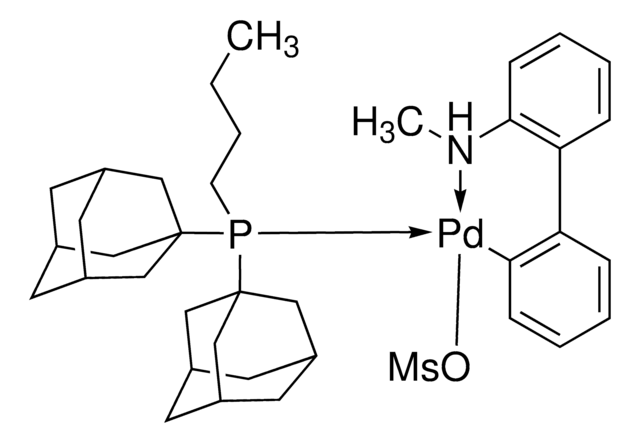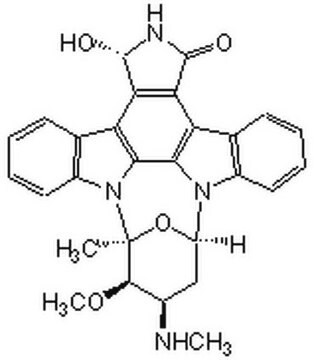SRP3155
SLIT-2-N human
recombinant, expressed in HEK 293 cells, ≥98% (SDS-PAGE), ≥98% (HPLC), suitable for cell culture
Synonyme(s) :
SLIL3, Slit homolog 2 protein
Se connecterpour consulter vos tarifs contractuels et ceux de votre entreprise/organisme
About This Item
Code UNSPSC :
12352202
Nomenclature NACRES :
NA.32
Produits recommandés
Source biologique
human
Produit recombinant
expressed in HEK 293 cells
Essai
≥98% (HPLC)
≥98% (SDS-PAGE)
Forme
lyophilized
Poids mol.
120.0-140.0 kDa
Conditionnement
pkg of 200 μg
pkg of 25 μg
Technique(s)
cell culture | mammalian: suitable
Impuretés
<0.1 EU/μg endotoxin, tested
Couleur
white
Numéro d'accès UniProt
Conditions d'expédition
wet ice
Température de stockage
−20°C
Informations sur le gène
human ... SLIT2(9353)
Description générale
Slit guidance ligand 2 (SLIT-2) is a member of the Slit family that signals through the Roundabout (Robo) receptor. It is also referred to as SLIL3. SLIT2 is expressed primarily in the fetal lung, kidney, and adult spinal cord, and to a lesser extent in adult adrenal gland, thyroid and trachea. It is initially synthesized as a 1499 amino acid precursor, which is subsequently cleaved into N-terminal and C-terminal fragments, designated as Slit2-N and Slit2-C respectively. The neurodevelopment related activities, as measured by the ability to repel olfactory bulb axons and to induce branching in dorsal root ganglia axons, are contained only in the N-terminal fragment. Recombinant human Slit2-N is a 1093 amino acid glycoprotein corresponding to the N-terminal portion of the full length Slit2 precursor. Due to glycosylation Slit2-N migrates at an apparent molecular weight of approximately 120.0-140.0kDa by SDS-PAGE analysis under reducing conditions.
Application
Slit guidance ligand 2 (SLIT-2) has been used to treat cells in podocyte culture and in myosin II regulatory light chain (MRLC) phosphorylation assay.
Actions biochimiques/physiologiques
Slit guidance ligand 2 (SLIT-2) acts as a repellent for axon guidance and neuronal migration, and it can also act as a chemoattractant to vascular endothelial cells and a chemotaxis inhibitor for leukocytes. It prevents the migration of T cells, neutrophils and macrophages, but enhances eosinophil migration. The protein has been shown to be downregulated in cancers.
Séquence
QACPAQCSCS GSTVDCHGLA LRSVPRNIPR NTERLDLNGN NITRITKTDF AGLRHLRVLQ LMENKISTIE RGAFQDLKEL ERLRLNRNHL QLFPELLFLG TAKLYRLDLS ENQIQAIPRK AFRGAVDIKN LQLDYNQISC IEDGAFRALR DLEVLTLNNN NITRLSVASF NHMPKLRTFR LHSNNLYCDC HLAWLSDWLR QRPRVGLYTQ CMGPSHLRGH NVAEVQKREF VCSGHQSFMA PSCSVLHCPA ACTCSNNIVD CRGKGLTEIP TNLPETITEI RLEQNTIKVI PPGAFSPYKK LRRIDLSNNQ ISELAPDAFQ GLRSLNSLVL YGNKITELPK SLFEGLFSLQ LLLLNANKIN CLRVDAFQDL HNLNLLSLYD NKLQTIAKGT FSPLRAIQTM HLAQNPFICD CHLKWLADYL HTNPIETSGA RCTSPRRLAN KRIGQIKSKK FRCSAKEQYF IPGTEDYRSK LSGDCFADLA CPEKCRCEGT TVDCSNQKLN KIPEHIPQYT AELRLNNNEF TVLEATGIFK KLPQLRKINF SNNKITDIEE GAFEGASGVN EILLTSNRLE NVQHKMFKGL ESLKTLMLRS NRITCVGNDS FIGLSSVRLL SLYDNQITTV APGAFDTLHS LSTLNLLANP FNCNCYLAWL GEWLRKKRIV TGNPRCQKPY FLKEIPIQDV AIQDFTCDDG NDDNSCSPLS RCPTECTCLD TVVRCSNKGL KVLPKGIPRD VTELYLDGNQ FTLVPKELSN YKHLTLIDLS NNRISTLSNQ SFSNMTQLLT LILSYNRLRC IPPRTFDGLK SLRLLSLHGN DISVVPEGAF NDLSALSHLA IGANPLYCDC NMQWLSDWVK SEYKEPGIAR CAGPGEMADK LLLTTPSKKF TCQGPVDVNI LAKCNPCLSN PCKNDGTCNS DPVDFYRCTC PYGFKGQDCD VPIHACISNP CKHGGTCHLK EGEEDGFWCI CADGFEGENC EVNVDDCEDN DCENNSTCVD GINNYTCLCP PEYTGELCEE KLDFCAQDLN PCQHDSKCIL TPKGFKCDCT PGYVGEHCDI DFDDCQDNKC KNGAHCTDAV NGYTCICPEG YSGLFCEFSP PMV
Forme physique
Lyophilized from 20 mM Tris + 200 mM L-Arginine, pH 8.8.
Reconstitution
Centrifuge the vial prior to opening. Reconstitute in 20mM Tris, pH 8.8 + 150mM NaCl to a concentration of 0.1-1.0mg/ml. Note: Slow to dissolve. Do not vortex. This solution can be stored at 2-8°C for up to 1 week. For extended storage, it is recommended to further dilute in a buffer containing a carrier protein (example 0.1% BSA) and store in working aliquots at -20°C to -80°C.
Code de la classe de stockage
11 - Combustible Solids
Classe de danger pour l'eau (WGK)
WGK 3
Point d'éclair (°F)
Not applicable
Point d'éclair (°C)
Not applicable
Faites votre choix parmi les versions les plus récentes :
Déjà en possession de ce produit ?
Retrouvez la documentation relative aux produits que vous avez récemment achetés dans la Bibliothèque de documents.
John A Legg et al.
Angiogenesis, 11(1), 13-21 (2008-02-12)
Angiogenesis describes the development of new blood vessels from pre-existing vessels. The hijacking of this physiological process by tumours allows them to develop their own supplies of nutrients and oxygen, enabling their growth and metastasis. A large body of literature
SLIT2/ROBO2 signaling pathway inhibits nonmuscle myosin IIA activity and destabilizes kidney podocyte adhesion.
Fan X
Insight (American Society of Ophthalmic Registered Nurses), 1(19), e86934-e86934 (2016)
Yang Li et al.
Neuroreport, 28(2), 75-81 (2016-11-29)
Neuronal network reconstruction is a pivotal determinant for functional recovery after spinal cord injury (SCI), the process of which includes synaptogenesis. Slit2 protein has been identified as a key regulator of axon regeneration and synapse formation in the vertebrate. Meanwhile
Rachel E Dickinson et al.
Reproduction (Cambridge, England), 139(4), 697-704 (2010-01-27)
The secreted SLIT glycoproteins and their Roundabout (ROBO) receptors were originally identified as important axon guidance molecules. They function as a repulsive cue with an evolutionarily conserved role in preventing axons from migrating to inappropriate locations during the assembly of
The differential roles of Slit2-exon 15 splicing variants in angiogenesis and HUVEC permeability.
Yang YC
Angiogenesis, 18(3), 301-312 (2015)
Notre équipe de scientifiques dispose d'une expérience dans tous les secteurs de la recherche, notamment en sciences de la vie, science des matériaux, synthèse chimique, chromatographie, analyse et dans de nombreux autres domaines..
Contacter notre Service technique
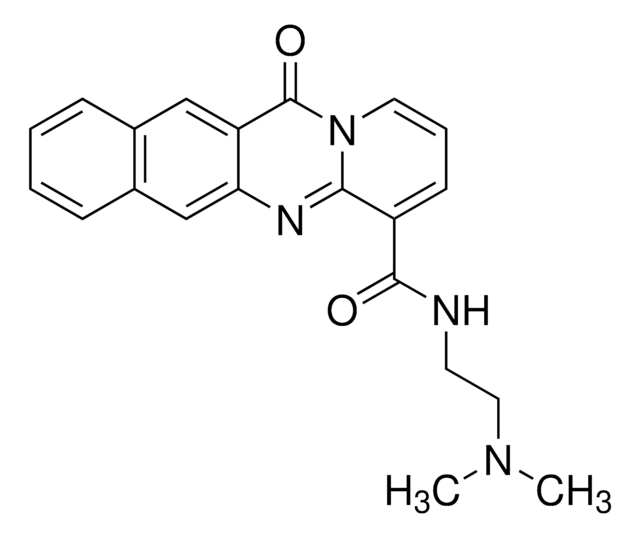

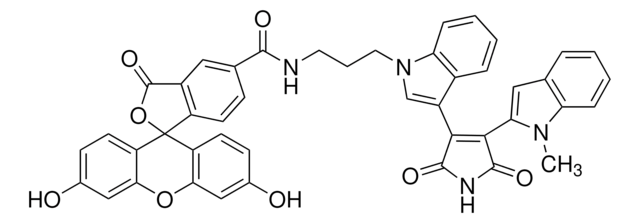
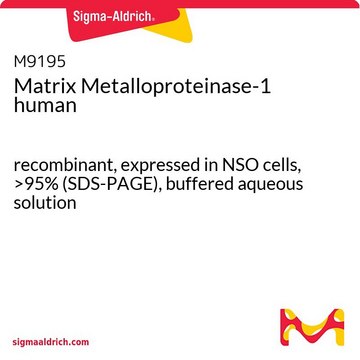

![1,8-Diazabicyclo[5.4.0]undéc-7-ène 98%](/deepweb/assets/sigmaaldrich/product/structures/120/564/5b373e23-1624-489c-8efb-692de0f96ffb/640/5b373e23-1624-489c-8efb-692de0f96ffb.png)
